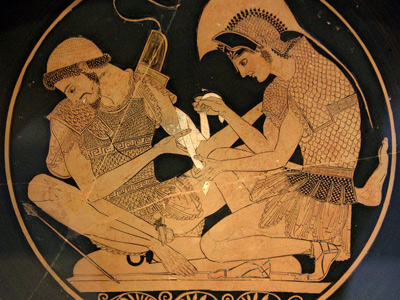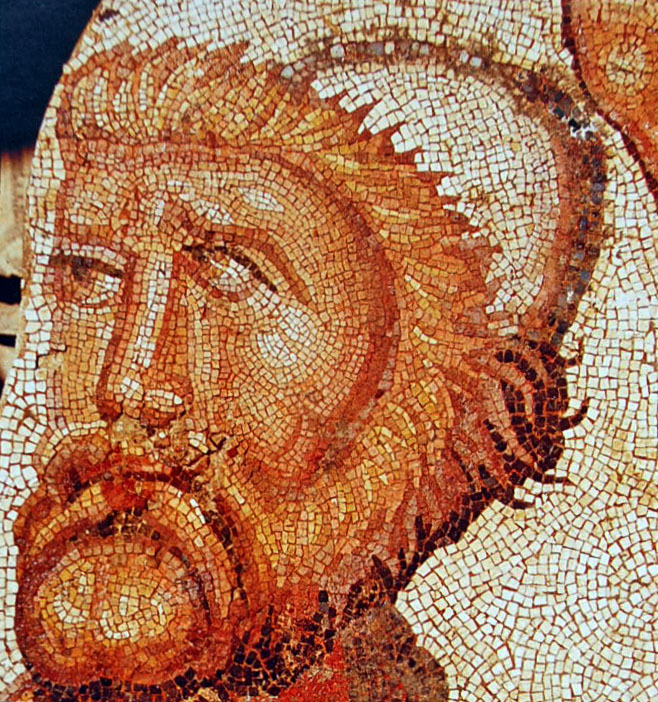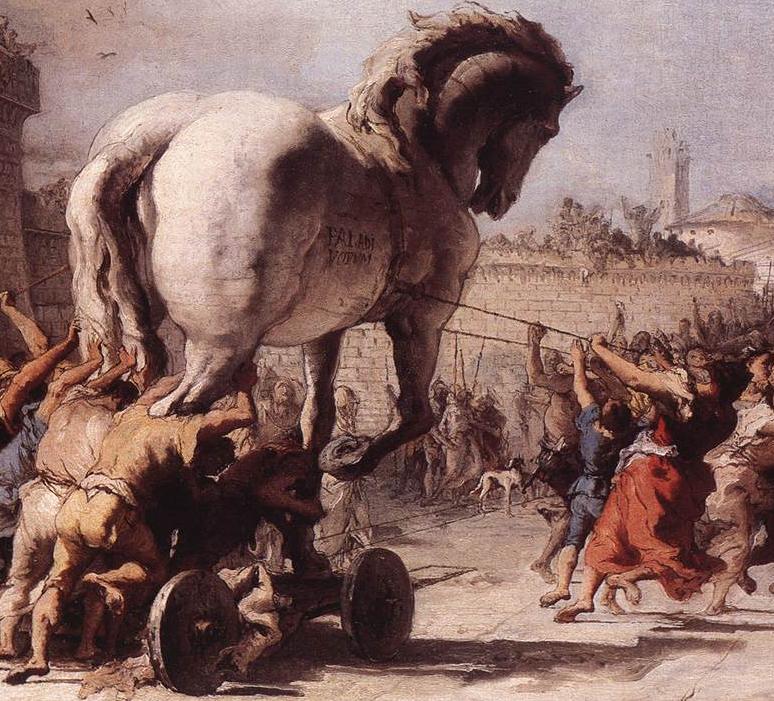Trojan War (1194–1184 BC)
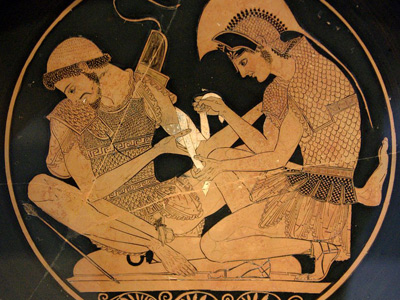
Nine Years of War
Philoctetes
Philoctetes was Heracles' friend, and because he lit Heracles's funeral pyre when no one else would, he received Heracles' bow and arrows. He sailed with seven ships full of men to the Trojan War, where he was planning on fighting for the Achaeans. They stopped either at Chryse Island for supplies, or in Tenedos, along with the rest of the fleet. Philoctetes was then bitten by a snake. The wound festered and had a foul smell; on Odysseus's advice, the Atreidae ordered Philoctetes to stay on Lemnos. Medon took control of Philoctetes's men. While landing on Tenedos, Achilles killed king Tenes, son of Apollo, despite a warning by his mother that if he did so he would be killed himself by Apollo. From Tenedos, Agamemnon sent an embassy to Priam, composed of Menelaus, Odysseus, and Palamedes, asking for Helen's return. The embassy was refused. Philoctetes stayed on Lemnos for ten years, which was a deserted island according to Sophocles' tragedy Philoctetes, but according to earlier tradition was populated by Minyans.
Calchas had prophesied that the first Achaean to walk on land after stepping off a ship would be the first to die. Thus even the leading Greeks hesitated to land. Finally, Protesilaus, leader of the Phylaceans, landed first. Odysseus had tricked him, in throwing his own shield down to land on, so that while he was first to leap off his ship, he was not the first to land on Trojan soil. Hector killed Protesilaus in single combat, though the Trojans conceded the beach. In the second wave of attacks, Achilles killed Cycnus, son of Poseidon. The Trojans then fled to the safety of the walls of their city. Protesilaus had killed many Trojans but was killed by Hector in most versions of the story, though others list Aeneas, Achates, or Ephorbus as his slayer. The Achaeans buried him as a god on the Thracian peninsula, across the Troad. After Protesilaus' death, his brother, Podarces, took command of his troops.
Achilles' campaigns
The Achaeans besieged Troy for nine years. This part of the war is the least developed among surviving sources, which prefer to talk about events in the last year of the war. After the initial landing the army was gathered in its entirety again only in the tenth year. Thucydides deduces that this was due to lack of money. They raided the Trojan allies and spent time farming the Thracian peninsula. Troy was never completely besieged, thus it maintained communications with the interior of Asia Minor. Reinforcements continued to come until the very end. The Achaeans controlled only the entrance to the Dardanelles, and Troy and her allies controlled the shortest point at Abydos and Sestus and communicated with allies in Europe.
Achilles and Ajax were the most active of the Achaeans, leading separate armies to raid lands of Trojan allies. According to Homer, Achilles conquered 11 cities and 12 islands. According to Apollodorus, he raided the land of Aeneas in the Troad region and stole his cattle. He also captured Lyrnassus, Pedasus, and many of the neighbouring cities, and killed Troilus, son of Priam, who was still a youth; it was said that if he reached 20 years of age, Troy would not fall. According to Apollodorus,
He also took Lesbos and Phocaea, then Colophon, and Smyrna, and Clazomenae, and Cyme; and afterwards Aegialus and Tenos, the so-called Hundred Cities; then, in order, Adramytium and Side; then Endium, and Linaeum, and Colone. He took also Hypoplacian Thebes and Lyrnessus, and further Antandrus, and many other cities.
Kakrides comments that the list is wrong in that it extends too far into the south. Other sources talk of Achilles taking Pedasus, Monenia, Mythemna (in Lesbos), and Peisidice. Among the loot from these cities was Briseis, from Lyrnessus, who was awarded to him, and Chryseis, from Hypoplacian Thebes, who was awarded to Agamemnon. Achilles captured Lycaon, son of Priam, while he was cutting branches in his father's orchards. Patroclus sold him as a slave in Lemnos, where he was bought by Eetion of Imbros and brought back to Troy. Only 12 days later Achilles slew him, after the death of Patroclus.
Ajax and a game of petteia
Ajax son of Telamon laid waste the Thracian peninsula of which Polymestor, a son-in-law of Priam, was king. Polymestor surrendered Polydorus, one of Priam's children, of whom he had custody. He then attacked the town of the Phrygian king Teleutas, killed him in single combat and carried off his daughter Tecmessa. Ajax also hunted the Trojan flocks, both on Mount Ida and in the countryside.
Numerous paintings on pottery have suggested a tale not mentioned in the literary traditions. At some point in the war Achilles and Ajax were playing a board game (petteia). They were absorbed in the game and oblivious to the surrounding battle. The Trojans attacked and reached the heroes, who were only saved by an intervention of Athena.
Death of Palamedes
Odysseus was sent to Thrace to return with grain, but came back empty-handed. When scorned by Palamedes, Odysseus challenged him to do better. Palamedes set out and returned with a shipload of grain.
Odysseus had never forgiven Palamedes for threatening the life of his son. In revenge, Odysseus conceived a plot where an incriminating letter was forged, from Priam to Palamedes, and gold was planted in Palamedes' quarters. The letter and gold were "discovered", and Agamemnon had Palamedes stoned to death for treason.
However, Pausanias, quoting the Cypria, says that Odysseus and Diomedes drowned Palamedes, while he was fishing, and Dictys says that Odysseus and Diomedes lured Palamedes into a well, which they said contained gold, then stoned him to death.
Palamedes' father Nauplius sailed to the Troad and asked for justice, but was refused. In revenge, Nauplius traveled among the Achaean kingdoms and told the wives of the kings that they were bringing Trojan concubines to dethrone them. Many of the Greek wives were persuaded to betray their husbands, most significantly Agamemnon's wife, Clytemnestra, who was seduced by Aegisthus, son of Thyestes.
Mutiny
Near the end of the ninth year since the landing, the Achaean army, tired from the fighting and from the lack of supplies, mutinied against their leaders and demanded to return to their homes. According to the Cypria, Achilles forced the army to stay. According to Apollodorus, Agamemnon brought the Wine Growers, daughters of Anius, son of Apollo, who had the gift of producing by touch wine, wheat, and oil from the earth, in order to relieve the supply problem of the army.
HISTORY
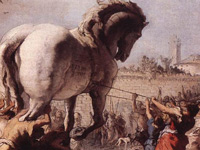
RESOURCES
This article uses material from the Wikipedia article "Trojan War", which is released under the Creative Commons Attribution-Share-Alike License 3.0.
© Stories Preschool. All Rights Reserved.
